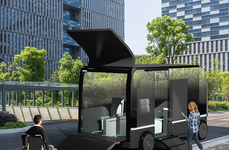
Thailand's uberASSIST is for People With Disabilities
References: tech.thaivisa
Uber and other ridesharing services have become ubiquitous in most cities around the world, and with Thailand's uberASSIST, those services stand to become equally as ubiquitous for people of all abilities. The new service, which has been released by Uber Thailand, allows people with disabilities to order specially equipped vehicles that can handle the needs of people with mobility problems or wheelchairs.
uberASSIST is effectively the same as standard uberX, though the company advises that those using the service should expect longer wait times for vehicles (since the uberASSIST fleet is much smaller). However, the prices for fares will be the same as uberX, meaning that those with disabilities can expect to travel around Bangkok — the first city in which uberASSIST is being released — with as much convenience and ease as anyone else.
uberASSIST is effectively the same as standard uberX, though the company advises that those using the service should expect longer wait times for vehicles (since the uberASSIST fleet is much smaller). However, the prices for fares will be the same as uberX, meaning that those with disabilities can expect to travel around Bangkok — the first city in which uberASSIST is being released — with as much convenience and ease as anyone else.
Trend Themes
1. Disability-friendly Ridesharing - Opportunity for ridesharing platforms to expand and offer specialized services for people with disabilities, providing convenience and ease of transportation.
2. Specialized Vehicles for People with Disabilities - Demand for specially equipped vehicles to accommodate people with mobility problems or wheelchairs, creating opportunities for manufacturers to develop and supply innovative transportation solutions.
3. Inclusive Transportation Services - Rise in inclusive ridesharing services that cater to the diverse needs of all passengers, creating a more accessible and inclusive transportation ecosystem.
Industry Implications
1. Ridesharing - Ridesharing platforms can disrupt the transportation industry by offering specialized services that cater to people with disabilities, expanding their user base and market share.
2. Automotive - Manufacturers have the opportunity to develop and provide specially equipped vehicles that cater to the needs of people with mobility problems or wheelchairs, tapping into a niche market.
3. Travel and Hospitality - The travel and hospitality industry can incorporate disability-friendly ridesharing services as part of their inclusive offerings, enhancing the overall travel experience for customers with disabilities.
1.2
Score
Popularity
Activity
Freshness























